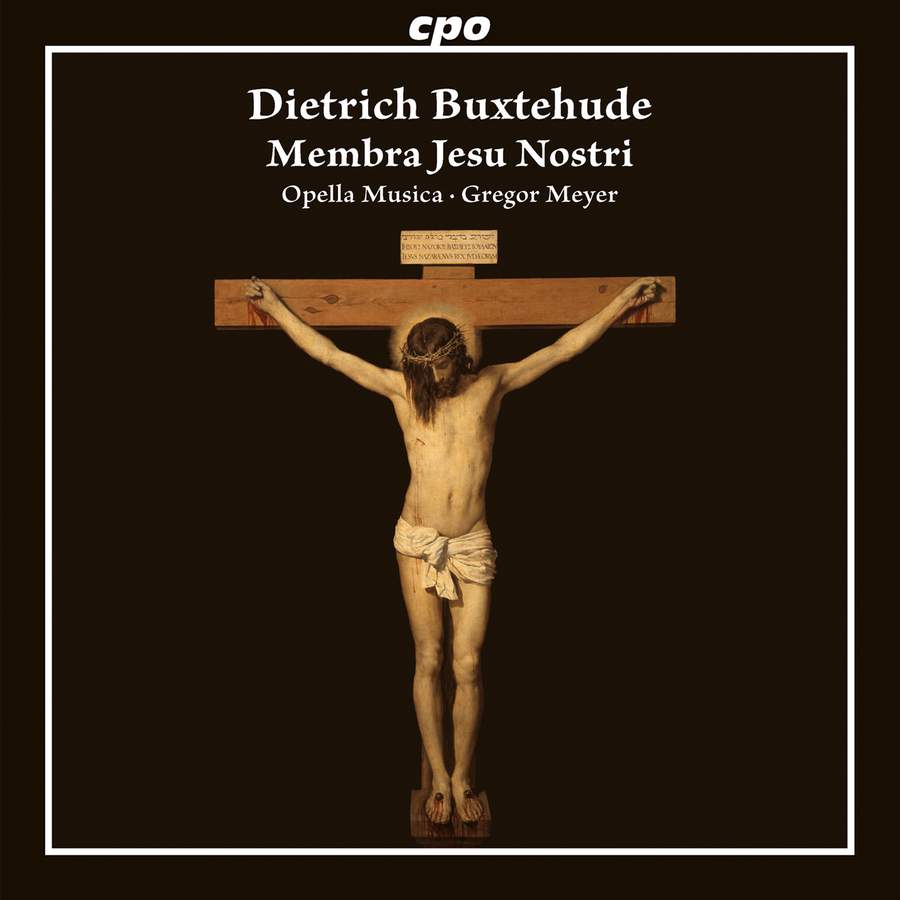BUXTEHUDE Membra Jesu Nostri
View record and artist detailsRecord and Artist Details
Genre:
Vocal
Label: CPO
Magazine Review Date: AW23
Media Format: CD or Download
Media Runtime: 64
Mastering:
DDD
Catalogue Number: CPO555 458-2

Tracks:
| Composition | Artist Credit |
|---|---|
| Membra Jesu nostri |
Dietrich Buxtehude, Composer
Gregor Meyer, Conductor Opella Musica |
| Führwahr, er trug unsere Krankheit |
Dietrich Buxtehude, Composer
Gregor Meyer, Conductor Opella Musica |
Author: Fabrice Fitch
It’s more than 10 years since I last encountered this ensemble, performing music by the Lassus pupil Johannes Eccard (9/12); in the interval they have committed all of Johann Kuhnau’s vocal music to disc on this label. Here they tackle a bigger fish, in repertorial terms at least, for there are plenty of accounts of Buxtehude’s only Latin-texted cantata cycle.
Opella Musica’s approach avoids monumentality in favour of concision, transparency and dynamism. (Try the opening chorus of the final cantata, ‘Ad faciem’, for example.) They shave six minutes off Cantus Cölln’s hour-long reading, for instance (both ensembles have the same soloists in the choruses as in the arias). The risk is that moments of great pathos and urgency (‘What are these wounds in the middle of your hands?’) are less poignant than some might wish, though the refusal to over-egg is no fault in itself. (In fairness, when that phrase is revisited at the end of ‘Ad pedes’, the approach is noticeably broader.)
While the voices individually don’t quite match those that Konrad Junghänel or Philippe Pierlot (for the Ricercar Consort) have at their disposal, their vision is not only different but consistently well defended. Towards the end of the tenor aria of ‘Ad pectus’ the continuo is suddenly more animated – a lovely touch, all the more noticeable and welcome for being used so sparingly (though it does make me wish for a bit more, all the same). The instrumental ensemble is compact, the acoustic comparatively dry and the miking comparatively close, all of which supports the main aesthetic choice; but it also exposes the odd misstep (with the voices at ‘Vulnerasti cor meum’ at the start of ‘Ad cor’, or with the instruments at the first instrumental ritornello of the tenor aria mentioned above).
All the same, having sampled quite a few other accounts, I can recommend this one wholeheartedly. There is a thoughtful essay on the work’s theological grounding, and (for some reason) two full-page photographs of the conductor.
Discover the world's largest classical music catalogue with Presto Music.

Gramophone Digital Club
- Digital Edition
- Digital Archive
- Reviews Database
- Full website access
From £8.75 / month
Subscribe
Gramophone Full Club
- Print Edition
- Digital Edition
- Digital Archive
- Reviews Database
- Full website access
From £11.00 / month
Subscribe
If you are a library, university or other organisation that would be interested in an institutional subscription to Gramophone please click here for further information.




